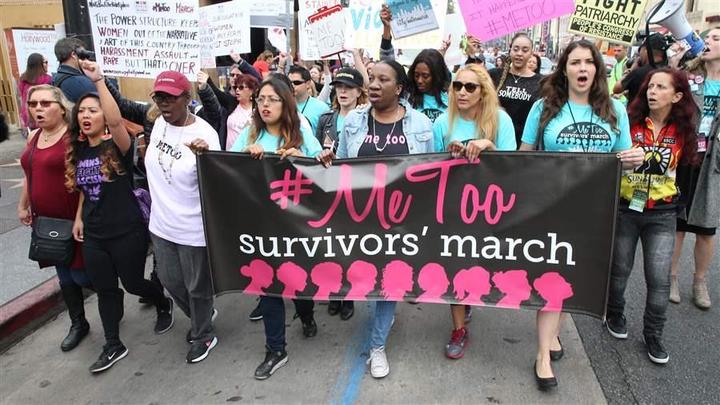One year ago, the #MeToo movement erupted across much of the Western world, starting in the United States. The Hollywood producer Harvey Weinstein was accused by a number of women of sexually assaulting and even raping them (charges he denies), and then other women came forward to say that they had also experienced sexual assault by other men, often powerful men, in the past and present.
The actress Asia Argento popularised the term #MeToo and soon huge numbers of women used the term to share their experiences via social media and elsewhere. (On Twitter the hashtag symbol ‘#’ is used to allow a conversation to be found more easily in an internet search.)
An often very angry debate began about the behaviour of men in general and especially powerful men. Why did they feel entitled to believe that women were at their sexual beck and call, and why did they so often act on this sense of entitlement? Why did they use their power to force women to have sex with them? Where was their sense of basic decency?
Classic example
Weinstein was the classic example of the type accused. He was one of the most powerful men in Hollywood, the producer of many famous movies, feted within the industry by everyone who counted, and with the power to make or break careers.
He does not deny that he has had sex with plenty of women, including aspiring actresses, but he insists it was all consensual. His accusers say he used his power over them to force them into having sex with him against their will; rape in other words. Weinstein has now been charged with multiple counts of sexual assault and rape.
In the weeks and months following the Weinstein revelations, other powerful men have been accused of sexual misconduct and been forced to resign, including famous American TV presenters such as Matt Lauer and Charlie Rose. Other careers are now under a cloud, all but destroyed, including that of the actor Kevin Spacey.
Almost exactly one year ago, the British Defence Minister Michael Fallon resigned because of ‘inappropriate’ behaviour. Some years previously he repeatedly put his hand on the knee of a radio journalist.
Already questions started to be asked of the #MeToo movement. Should a man really have his career destroyed for that? Fallon’s offence seemed of an altogether different order to the alleged offences committed by the likes of Weinstein.
Asia Argento herself has now been accused of sexually assaulting a young actor when he was 17, just under the Californian age of consent of 18, a charge she denies.
Within feminism, a split occurred. An older generation of feminists who were young in the 1960s when the sex revolution started, wondered if there was a strong whiff of puritanism about the #MeToo movement. Genuine sexual assault was one thing, but if a man could have his career destroyed for a clumsy pass that was going too far.
What should a Christian make of the #MeToo phenomenon? Christians have been critical of the sex revolution from the beginning. The revolution’s aim was, and is, to separate sex from genuine emotional intimacy, never mind marriage, if that is what the two people want. Sex between any two people, including two people who have just met, was to be potentially available at all times, on the sole condition of consent.
Christians have always believed that sex cannot be so easily separated from an emotional setting without causing problems.
We also believed, and believe, that if men came to think women were always potentially sexually available it would lead to a consequent decline in respect for women, which is what happened in many cases, and which the #MeToo movement is now shining a spotlight on. In fact, back in 1968 the papal encyclical Humanae Vitae predicted exactly this.
Critics of Christian sexual morality will, of course, attack it as repressive and point out that it often bore down more heavily on women, especially those who became pregnant outside of marriage. And it is true that traditional societies in general (not just Christian ones) were inclined to make female sexuality the bigger problem, not male sexuality.
But it should be apparent now that the sexual revolution was not the answer. Making consent alone the be-all and end-all of sexual relations is not enough. When you rip sex from a context of emotional intimacy problems will mount. Two people who don’t really know each other, who are not properly acquainted, who do not trust each other fully, are much more likely to feel disrespected, used or abused by a sexual encounter than two people who know, like and trust each other. And dare we whisper it, who might even love each other and wish to marry?
The fact that women are the ones coming forward to tell of stories of sexual abuse, and few men are, indicates in itself that women and men respond differently to sexual encounters. It seems that women are far more likely than men to feel used or abused.
The #MeToo movement is a good thing if it raises the standard of basic decency among those men who need their standards raised. On the other hand, when the movement starts attacking the presumption of innocence, and leads us to believe that once a man is accused of sexual misconduct, he must be guilty, then that is a very bad thing.
But the movement overall shows that not all is well with the sexual revolution and it is in need of reform. A feminism that does not destroy the presumption of innocence in its desire to improve the behaviour of the sexes towards each other might well lead that reform.


 David Quinn
David Quinn
